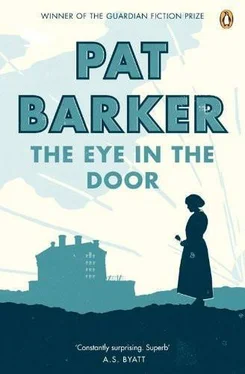There was no point arguing with any of this. It took Rivers three hours to calm him down and get him to sleep. Even after his breathing had become steady, Rivers went on sitting by the bed, afraid to move in case the withdrawal of his hand should cause him to wake. Long hairs on the back of Siegfried’s forearm caught the light. Rivers looked at them, too exhausted to think clearly, remembering the experiments he and Head had done on the pilomotor reflex. Head’s hairs had become erect every time he read a particular poem. The holy shiver, as the Germans call it. For Head it was awakened by poetry; for Rivers, more than once, it had been the beauty of a scientific hypothesis, one that brought into unexpected harmony a whole range of disparate facts. What had intrigued Rivers most was that human beings should respond to the highest mental and spiritual achievements of their culture with the same reflex that raises the hairs on a dog’s back. The epicritic grounded in the protopathic, the ultimate expression of the unity we persist in regarding as the condition of perfect health. Though why we think of it like that, God knows, since most of us survive by cultivating internal divisions.
Siegfried was now deeply asleep. Cautiously, Rivers withdrew his hand, flexing the fingers. It had grown colder and Siegfried had fallen asleep outside the covers. Rivers went to shut the window, and stood for a moment attempting to arrange the story he’d been told into a coherent pattern, but that wasn’t possible, though the outline was clear enough. Siegfried had always coped with the war by being two people: the anti-war poet and pacifist; the bloodthirsty, efficient company commander. The dissociation couldn’t be called pathological, since experience gained in one state was available to the other. Not just available : it was the serving officer’s experience that furnished the raw material, the ammunition, if you liked, for the poems. More importantly, and perhaps more ambiguously, that experience of bloodshed supplied the moral authority for the pacifist’s protest: a soldier’s declaration. No wonder Pinto’s innocent question had precipitated something of a crisis.
Though he would have broken down anyway this time, Rivers thought. He had gone back hating the war, turning his face away from the reality of killing and maiming, and as soon as that reality was borne in upon him, he had found the situation unbearable. All of which might have been foreseen. Had been foreseen.
Night had turned the window into a black mirror. His face floated there, and behind it, Siegfried and the rumpled bed. If Siegfried’s attempt at dissociation had failed, so had his own. He was finding it difficult to be both involved and objective, to turn steadily on Siegfried both sides of medicine’s split face. But that was his problem. Siegfried need never be aware of it.
It was still dark. A light wind stirred the black trees in the park. He took his boots off and climbed on to the other bed, not expecting to be able to sleep, but thinking that at least he might rest. He closed his eyes. At first his thoughts whirred on, almost as active as Siegfried’s and not much more coherent. For some reason the situation reminded him of sleeping on board the deck of a tramp steamer travelling between the islands of Melanesia. There, one slept in a covered cabin on deck, on a bench that left vertical stripes down one’s back, surrounded by fellow passengers, and what a motley assemblage they were. He remembered a particular voyage when one of his companions had been a young Anglican priest, so determined to observe holy modesty in these difficult conditions that he’d washed the lower part of his body underneath the skirt of his cassock, while Rivers stripped off and had buckets of water thrown over him by the sailors who came up to swab the deck.
His other companion on that trip had been a trader who rejoiced in the name of Seamus O’Dowd, though he had no trace of an Irish accent. O’Dowd drank. In the smoky saloon after dinner, belching gin and dental decay into Rivers’s face, he had boasted of his exploits as a blackbirder, for he’d started life kidnapping natives to work on the Queensland plantations. Now he simply cheated them. His most recent coup had been to convince them that the great Queen (nobody in the Condominion dared tell the natives Victoria was dead) found their genitals disgusting, and could not sleep easy in her bed at Windsor until they were covered by the long johns that Seamus had inadvertently bought as part of a job lot while even more drunk than usual.
They wore them on their heads, Rivers remembered. It had been a feature of the island in that first autumn of the war, naked young men wearing long johns elaborately folded on their heads. They looked beautiful. Meanwhile, in England, other young men had been rushing to don a less flattering garb.
Drifting between sleep and waking, Rivers remembered the smells of oil and copra, the cacophony of snores and whistles from the sleepers crammed into the small cabin on deck, the vibration of the engine that seemed to get into one’s teeth, the strange, brilliant, ferocious southern stars. He couldn’t for the life of him think what was producing this flood of nostalgia. Perhaps it was his own experience of duality that formed the link, for certainly in the years before the war he had experienced a splitting of personality as profound as any suffered by Siegfried. It had been not merely a matter of living two different lives, divided between the dons of Cambridge and the missionaries and headhunters of Melanesia, but of being a different person in the two places. It was his Melanesian self he preferred, but his attempts to integrate that self into his way of life in England had produced nothing but frustration and misery. Perhaps, contrary to what was usually supposed, duality was the stable state; the attempt at integration, dangerous. Certainly Siegfried had found it so.
He raised himself on his elbow and looked at Siegfried, who was sleeping with his face turned to the window. Perhaps the burst of nostalgia was caused by nothing more mysterious than this: the attempt to sleep in a room where another person’s breathing was audible. Sleeping in the same room as another person belonged with his Melanesian self. In England it simply didn’t happen. But it was restful, the rise and fall of breath, like the wash of waves round the prow of the boat, and gradually, as the light thinned, he drifted off to sleep.
He woke to find Siegfried kneeling by his bed. The window was open, the curtains lifting in the breeze. A trickle of bird-song came into the room.
In a half-embarrassed way, Siegfried said, ‘I seem to have talked an awful lot of rubbish last night.’ He looked cold and exhausted, but calm. ‘I suppose I had a fever?’
Rivers didn’t reply.
‘Anyway, I’m all right now.’ Diffidently, he touched Rivers’s sleeve. ‘I don’t know what I’d do without you.’
A week later Rivers was sitting in his armchair in front of the fire, feeling physically tired in an almost sensuous way. This was a rare feeling with him, since most days produced a grating emotional exhaustion which was certainly not conducive to sleep. But he had been flying, which always tired him out physically, and he’d seen Siegfried a lot calmer and happier than he had recently been, though still very far from well.
Prior was the mystery. Prior had missed an appointment, something he’d never done before, and Rivers wasn’t sure what he should do about it. There was little he could do except drop Prior a line expressing his continued willingness to help, but there had been some suggestion that Prior worried about the degree of his dependence. If he had decided to break off the association there was nothing Rivers could — or should — do about it. He wouldn’t come now. He was over two hours late.
Читать дальше












